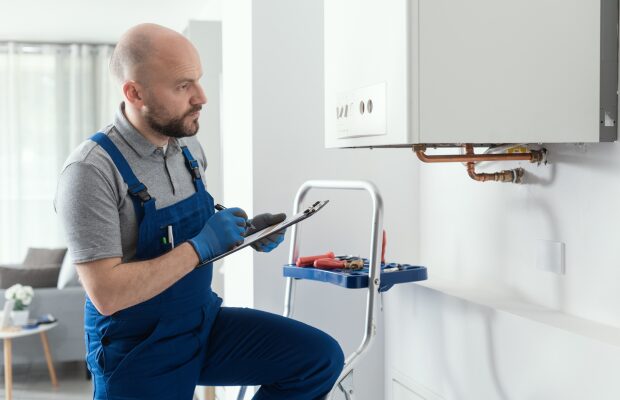Arranging a building survey is something most home buyers will do once they’ve had their offer accepted. Although surveys are not a legal requirement for buying a property, they may prevent unnecessary surprises down the line.
In this guide, we’ll explain everything you need to know about the various surveys you can choose from, highlight what your surveyor will check, and explain your next steps once your survey is completed.
What does a surveyor do?
Property surveyors are experts in construction and can examine buildings, look for defects and provide information and reports on the cost of remedial work.
Surveyors and their reports can help property buyers decide if proceeding with a purchase is the right step to take.
What are the types of house surveys and how much do they cost?
There are three main types of survey you can choose from when buying a property, from a basic survey to a full structural examination.
1. RICS Home Survey – Level 1
What is this: Basic Condition Report.
Who is this for: Modern properties in good condition or new builds.
Average Cost: £500 – £950.
The Level 1 survey from the Royal Institution of Chartered Surveyors (RICS) is the most basic property survey available.
It’s suitable for more modern properties that are in good condition and built with current techniques and materials.
The Level 1 survey uses a traffic light rating system to give you a good overview of the property’s condition without providing major detail.
2. RICS Home Survey – Level 2 (Homebuyers Survey)
What is it: Intermediate Condition Report with valuation.
Who is this for: Home buyers looking for peace of mind.
Average cost: £600 – £1,000.
Previously known as the Homebuyers Survey, the RICs Level 2 survey is the most common choice for property buyers.
The surveyor looks at the property in the same way as a Level 1 survey but will highlight any issues that could affect its value, while also providing guidance on remedial work and ongoing maintenance.
Any aspects of the property’s construction that don’t meet current building regulations will also be highlighted, alongside major issues like damp or subsidence.
3. RICS Home Survey – Level 3
What is this: Detailed condition report.
Who is this for: Buyers of older or period properties or properties in poor condition.
Average cost: £700 – £1,500
The RICS Level 3 survey is the most comprehensive and is suitable for older properties or those that have been designed and constructed in a non-standard way.
Unlike the Level 2 survey, a Level 3 survey sees the surveyor check under floorboards and in the roof space, while also providing repair and maintenance advice on any defects listed.
You can also request detailed projected costs for any major work as part of the Level 3 survey.
How much do building surveys cost?
The cost of a property survey will vary depending on the size, value, type, and location of the property you’re thinking of buying.
Surveyors may also cost their work differently, so be sure to shop around before deciding on who to use.
Average UK survey costs, at a glance
| Survey type | Average cost |
| RICS – Level 1 | £500 – £950 |
| RICS – Level 2 | £600 – £1,000 |
| RICS – Level 3 | £700 – £1,500 |
What do building surveyors look for?
Homebuyers Survey (RICS Level 2) checklist
The Homebuyers Survey, or RICS Level 2 survey, sees your surveyor check all major, visible interior features, including:
- Ceilings
- Walls
- Bathroom fixtures
- Heating systems
- Drainage
- Electrical installations
- Water services
- Windows
- Doors
The surveyor will also check exterior pipework, roof, and guttering, as well as damp-proofing, insulation, and woodwork for signs of rot or woodworm.
The Level 2 survey also uses a traffic light system to grade defects:
- Green – no action required
- Amber – repair work needed but not urgently
- Red – serious defect with urgent need for repair work
Common problems flagged in surveys
Some of the most common issues found during property surveys include:
| Problem | What it means |
| Damp | Surveyors will often find problems with rising damp in older properties, where the damp proof course is either bridged or non-existent. Issues with penetrating damp, caused by roof or pipe defects, will also be found |
| Invasive plants | Highly invasive plants like Japanese Knotweed can cause problems for properties and outbuildings |
| Subsidence | Issues with subsidence, where a property sinks due to problems with its foundations, can be hugely expensive to remedy |
| Rotten wood | Wet rot, decay, and dry rot can weaken structural timber, and this can be expensive to treat |
| Electrical issues | Rewiring an entire property is costly and your surveyor will highlight any issues with dated wiring |
What happens after a survey?
Once your survey is completed and you’ve received your surveyor’s report, you should read through it and make a note of anything you’re concerned about or don’t understand.
Your surveyor should be happy to chat through any concerns you have and answer any questions, although they’re not allowed to advise whether you should proceed with your purchase.
If your survey does highlight anything you’re concerned about, however, you have options:
1. Pull out of the sale
You’re not legally obliged to purchase the property until you’ve exchanged contracts with your seller and your survey is in place before that happens.
If you’re really concerned about anything highlighted in your survey and you’re not comfortable proceeding, you can pull out of the sale.
2. Negotiate with your seller
Chat to your seller’s estate agent about the issues highlighted in your survey.
You may be able to negotiate with the seller over:
- Them fixing the issues before proceeding with the sale
- Renegotiating the price you’re prepared to pay for their home
Should I be worried about a Homebuyers Survey?
Being apprehensive about a property survey is perfectly natural – after all, you’re already emotionally invested in a property once you get to the survey stage.
But property surveys are in place to provide you with the information you need to make a sound decision on your purchase.
So, try to remain positive and calm about your survey until its completed and you’re made aware of any potential issues with the property.
When buying a house, who organises the survey?
It’s the role of the buyer to organise a survey on the property they’re interested in.
Once your offer has been accepted, you can organise a suitable survey to be carried out before you commit to exchanging contracts with your seller.
In some cases, the seller may also wish to arrange their own independent survey
Do you need a surveyor on a new build?
While a new build property should have no issues, it can be worth having a survey carried out for total peace of mind.
New builds come with builder’s warranties, while developers should also allow you a period of time to undertake ‘snagging’, where you highlight any defects, and they fix them.
Having a survey carried out can help highlight potential snagging issues that could have more serious consequences in the future, including poorly fitted windows, disconnected waste pipes, and badly finished render.
How long do surveys take?
The more detailed the survey you choose, the more time it will take to carry out.
A Homebuyers Survey, or RICS Level 2 survey, will usually take between two and four hours to complete, while a more detailed Level 3 survey could take around eight hours.
The amount of time it takes to receive your surveyors report varies, but a RICS Level 2 survey report is usually returned within five working days and a Level 3 report within eight working days.
In summary: What is a survey?
- There are three kinds or building survey, each varying in price.
- The most common survey is Homebuyers Survey, or RICS Level 2 survey.
- Your survey will take between 2-8 hours and costs between £500-£1500, depending on the level you choose.
- Your surveyor will check the interior and exterior of the property.
- Common issues identified by a survey include: damp, subsidence, rotten wood, invasive plants and electrical issues.
Further reading…
- The deposit options you have when buying for the first time
- All the fees you can expect when buying a house
- Great tips to make your home attractive to buyers
Still need help? Contact your local Parkers branch today.







